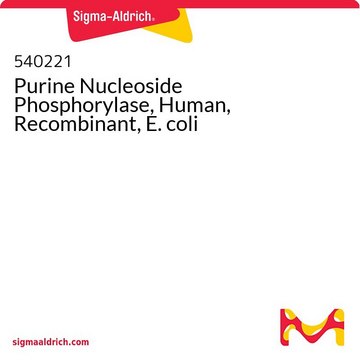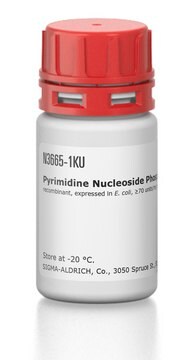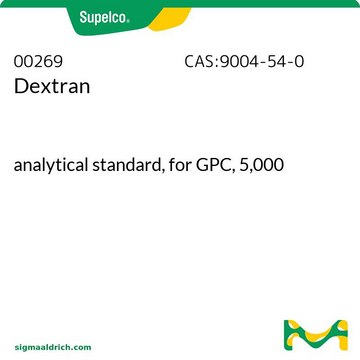Alle Fotos(1)
Wichtige Dokumente
39488
Pyrimidinnukleosidphosphorylase
recombinant, expressed in E. coli, ≥1300 U/mL
Anmeldenzur Ansicht organisationsspezifischer und vertraglich vereinbarter Preise
Alle Fotos(1)
About This Item
CAS-Nummer:
MDL-Nummer:
UNSPSC-Code:
12352204
NACRES:
NA.54
Empfohlene Produkte
Rekombinant
expressed in E. coli
Qualitätsniveau
Form
liquid
Spezifische Aktivität
≥1300 U/mL
Relevante Krankheit(en)
cancer
Lagertemp.
−20°C
Suchen Sie nach ähnlichen Produkten? Aufrufen Leitfaden zum Produktvergleich
Anwendung
Pyrimidine nucleoside phosphorylase (PyNPase) may be used as a marker to predict the malignant potential of breast cancer, especially lymph node metastasis. PyNPase is used to study breast cancer, specifically its role in angiogenesis.
Biochem./physiol. Wirkung
Pyrimidine nucleoside phosphorylase (PyNPase) is a glycosyltransferase that catalyzes the conversion of pyrimidine nucleoside and phosphate to a pyrimidine base and α-D-ribose 1-phosphate. PyNPase plays a significant role in breast cancer angiogenesis.
Einheitendefinition
One unit will convert 1 μmole each of thymidine and phosphate to thymine and 2-deoxyribose 1-phosphate per minute at pH 7.4 and 25°C
Signalwort
Danger
H-Sätze
P-Sätze
Gefahreneinstufungen
Resp. Sens. 1
Lagerklassenschlüssel
12 - Non Combustible Liquids
WGK
WGK 1
Flammpunkt (°F)
Not applicable
Flammpunkt (°C)
Not applicable
Hier finden Sie alle aktuellen Versionen:
Analysenzertifikate (COA)
Lot/Batch Number
Die passende Version wird nicht angezeigt?
Wenn Sie eine bestimmte Version benötigen, können Sie anhand der Lot- oder Chargennummer nach einem spezifischen Zertifikat suchen.
Besitzen Sie dieses Produkt bereits?
In der Dokumentenbibliothek finden Sie die Dokumentation zu den Produkten, die Sie kürzlich erworben haben.
K Mimori et al.
Annals of oncology : official journal of the European Society for Medical Oncology, 10(1), 111-113 (1999-03-17)
The clinical significance of pyrimidine nucleoside phosphorylase (PyNPase) activity in breast carcinomas has never been determined. In 41 cases of breast carcinoma, the enzyme activity of PyNPase was determined by the high performance liquid chromatography (HPLC) assay and its value
K Okuyama et al.
Bioscience, biotechnology, and biochemistry, 60(10), 1655-1659 (1996-10-01)
The pyrimidine nucleoside phosphorylase (Py-NPase) of Bacillus stearothermophilus TH 6-2 is a dimer of 46-kDa subunits and catalyzes the reversible phosphorolysis of uridine and thymidine. The gene encoding this pyrimidine nucleoside phosphorylase (pyn gene) has been cloned and sequenced from
T Hamamoto et al.
Bioscience, biotechnology, and biochemistry, 60(7), 1179-1180 (1996-07-01)
The purine nucleoside phosphorylase (Pu-NPase) and the pyrimidine nucleoside phosphorylase (Py-NPase) have been purified from Bacillus stearothermophilus TH 6-2. The Pu-NPase is a trimer of 30-kDa subunits and the Py-NPase is a dimer of 46-kDa subunits. The isoelectric points of
M J Pugmire et al.
Structure (London, England : 1993), 6(11), 1467-1479 (1998-11-18)
Pyrimidine nucleoside phosphorylase (PYNP) catalyzes the reversible phosphorolysis of pyrimidines in the nucleotide synthesis salvage pathway. In lower organisms (e.g. Bacillus stearothermophilus) PYNP accepts both thymidine and uridine, whereas in mammalian and other higher organisms it is specific for thymidine
Purification and comparative properties of a pyrimidine nucleoside phosphorylase from Bacillus stearothermophilus.
P P Saunders et al.
The Journal of biological chemistry, 244(13), 3691-3697 (1969-07-10)
Unser Team von Wissenschaftlern verfügt über Erfahrung in allen Forschungsbereichen einschließlich Life Science, Materialwissenschaften, chemischer Synthese, Chromatographie, Analytik und vielen mehr..
Setzen Sie sich mit dem technischen Dienst in Verbindung.









